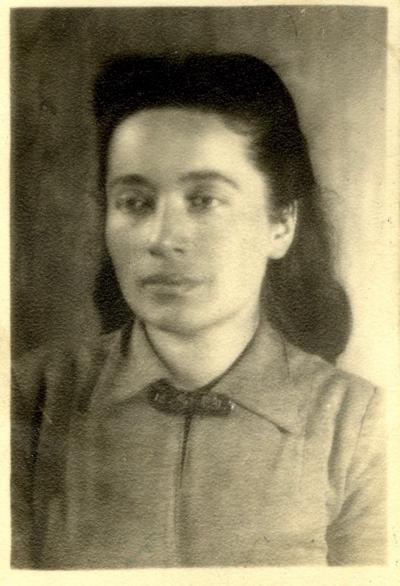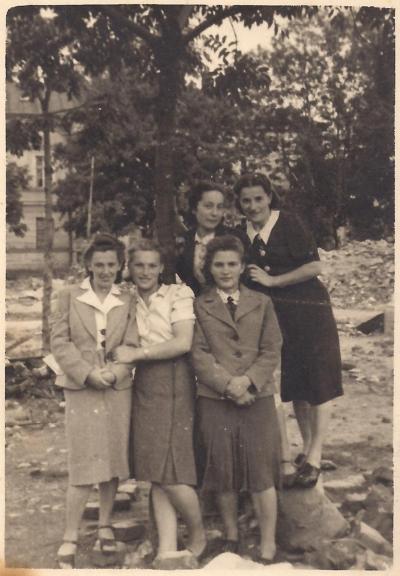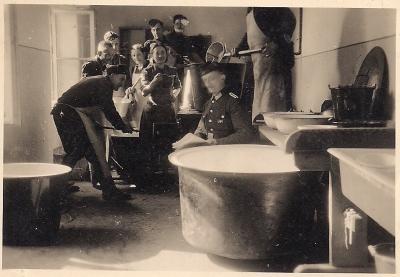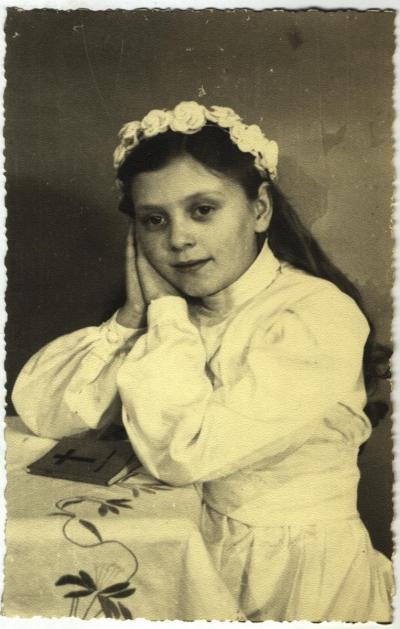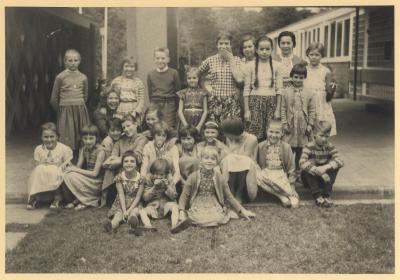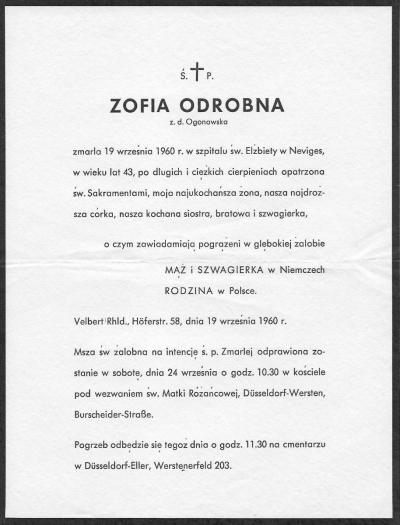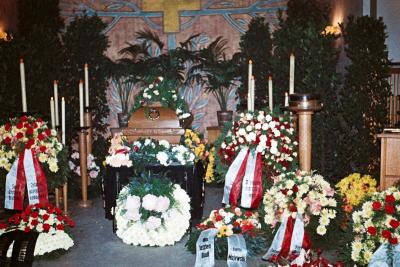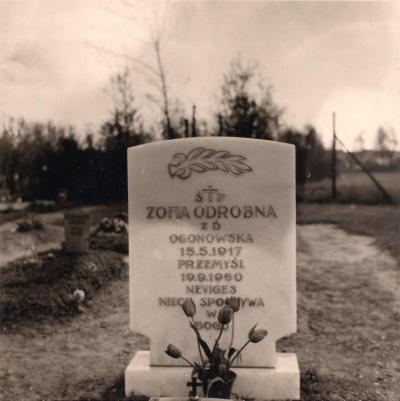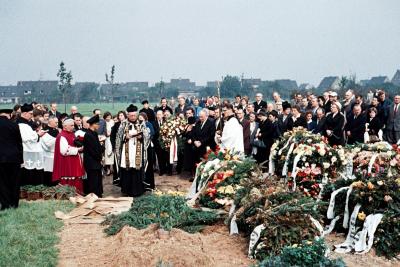Zofia Odrobna
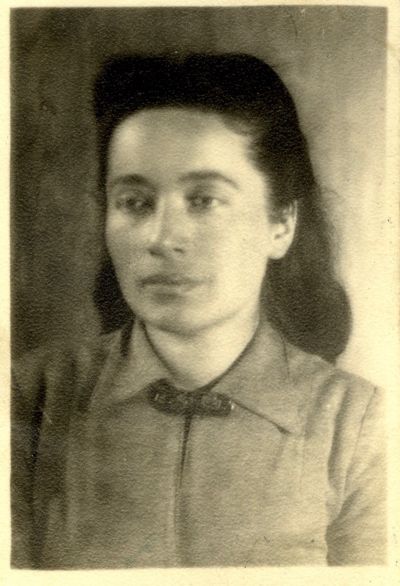
Zofia Odrobna (1917-1960) – the mother to “lost” children
This is the story of a woman who is scarcely known in her hometown of Przemyśl and who played an important role in the history of Polish “displaced persons” (DPs) and refugees in post-war Germany. In the post-war confusion she helped many of them to find somewhere to live, and others to build a new home. Zofia Odrobna was the wife of Kazimierz Odrobny, the long-standing chair of the League of Polish Refugees (Zjednoczenie Polskich Uchodźców) and other refugee organisations in the Federal Republic of Germany. For many years she lived in the shadow of her fiancé and later husband but this did not to depress her. Both followed their own calling: to help Polish DPs and refugees. Sadly Zofia Odrobna died at an early age. But she has remained indelibly etched in the minds of many Poles in Germany and Great Britain.
Zofia Irena Odrobna, (née Ogonowska) was born on 15. May 1917 in Żurawica, in the parish of Przemyśl, where she also spent her childhood and early youth. She was the oldest daughter of Tomasz Ogonowski and his wife, Bronisława, née Rak. She attended the local school from 1923 to 1927 and after the family moved to Przemyśl – she lived on the edge of the town in Kozanów Street in Zasanie – attended the girls grammar school there from 1927 to 1935. After getting good exam results in her A-levels, in 1936 she began a course in education in the humanist faculty at the Johann Kasimir University in Lemberg[1]. The keen young student was very similar to many of her fellow students. The Second World War broke out at the end of the third year after the border between the Third Reich and the Soviet Union was redrawn following the Ribbentrop-Mołotow pact. As a result she abandoned her studies and returned to Przemyśl. When the town was divided she moved with her parents and younger sister to the German sector where she found employment in an agricultural business just outside the gates of the town until October 1941. The occupying arms forced her to work as a kitchen girl in an army garrison between 1941 and 1943. When the situation of the German occupying forces deteriorated her sister Izabela was earmarked for forced labour in Germany. Since Zofia was some years older she asked to be substituted for the transport. In this way she succeeded in protecting her sister from the toils and labour in Germany. As a result Izabela was never sent to forced labour but lived with her parents in Przemyśl until the end of the war. Zofia was deported to Germany in mid March 1943 and arrived in Libur on 27. March that year: Libur is now a part of the district of Porz in Cologne, North Rhine Westphalia.
[1] Today: Ivan Franko National University of Lviv, Ukraine (editor´s note)
In Libur she was sent to work in a small farm, where she looked after the cows and helped to grow agricultural products. In one of the many letters she had sent to her parents, she wrote:
“(…) just recently I cut down thistles in the cornfield with Anna and weeded the garden. Today I shall be planting potatoes. Last week we worked on the rhubarb patch for three days with Anna and Bernard, and then loaded it onto wagons at the railway station. We have to remove the leaves from the rhubarb sticks and tie them up into 10 kilogram bundles. In two weeks we will be cutting them once again on another field. Today is Thursday, a public holiday: all the same we had to work the whole day because of the war. The others have to work until midday, or not at all. (…). on Sunday it's my turn to milk the cows and I shall stay home the whole day. The chef's mother promised me some cake – [illegible word, note by the author ŁW], but couldn't give it me until my name day. My old lady promised to bake a sponge cake for Sunday, for me and Bernard, since his name day is on 22. May. The old lady has already reminded me to give two slices to Wanda. Wanda has some good living quarters in the pub with her sister, Gerta. Gerta gave me a bottle of liquor on my name day, which we drunk with Wanda, her husband and her two brothers (…). I got a new strawberry coloured cotton dress from the old lady. Even the chef told me that I looked nice in it. Their sister gave me a green dress made of cotton. It was second-hand but will be just right for a summer Sunday. On top of that I was given five official ration coupons that I've already spent; 1. a frock, 2. a blouse, 3. stockings, 4. a warm shirt and 4. on top of that, some trousers, something I have been unable to buy so far, since there were none in the shop. I have given the stockings and a shirt to Anna, she'll give them back to me when the coupons with her name arrive . I gave her other things to stop being jealous. We both got a pair of wooden clogs and an apron. I'm in much better health than in spring and even when I often get ill and have to go to hospital, unfortunately I don't feel deprived of anything at all (…)”.
But health problems were unavoidable because of the strenuous agricultural work. The resulting infections were either not treated at all or treated wrongly. As a result her health deteriorated and heavy complications occurred.
She was liberated by the British army in Libur when the war ended in May 1945. Subsequently the occupying forces brought her to a DP camp in the Cologne suburb of Mühlheim, where she stayed until August 1946. She was then transferred to the DP camp in Knechtsteden, but was again moved by the occupying forces in October 1946 to the camp in Lippstadt, where she remained until June 1948. In June 1950 she was initially moved to the DP camp in Höxter, which she was allowed to leave for a new home in a suburb specially built for refugees in Velbert.
Zofia Ogonowska met her late husband, Kazimierz Odrobny, in the Mülheim camp in 1946. They became increasingly attached to one another whilst Zofia was being admired on all sides. Kazimierz Odrobny even proposed to her in 1946 but he had to wait another three years before she consented. She wrote to her family: “My marriage to Mr O. is irrevocable and there is nothing I can do to get out of it unless you write to me that I must definitely return. Although I am continually ill and always lack something, he tells me that nothing can make him change a decision that he has made a long time ago and what he has been telling me for a long time, as far back as Muhlheim [sic!] (…)”.
Zofia and Kazimierz shared a passion for teaching the very young. Both of them campaigned to set up a Polish grammar school for the DPs in Lippstadt in the British occupying zone. Zofia decided to abandon the studies that had been interrupted by the war. She discovered her interest in working as a teacher and gave lessons in foreign languages and piano playing in the Polish DP camp schools in Mülheim, Knechtsteden and later too also in Lippstadt; all this time she worked in surroundings nearby to Kazimierz Odrobny. As a teacher she concentrated mostly on the youngest generation of Polish DPs. She prepared girls for their first Communion, and acted as a godmother for the very young. In this respect she also participated in a programme initially instituted by the Polish Red Cross (Polski Czerwony Krzyż), and subsequently taken over by the Society for Supporting the Poles in Germany (Towarzystwo Pomocy Polakom w Niemczech) and the Polish Association in Germany (Zjednoczenie Polskie w Niemczech), to find families prepared to adopt children who had remained in occupied Germany after the war. Her commitment in looking for future parents for young Polish DPs also resulted in her finding a huge number of substitute families in the USA, Great Britain, Australia and Canada. She devoted all her energies as an educator and teacher of Polish children, in addition to her work supporting Polish refugees in Germany. Even when it is difficult to document her welfare work for Polish DPs in Germany must surely be regarded as extremely difficult and complicated.
After moving from the Polish school in Cologne-Mühlheim, Zofia continued her work as a teacher in the Polish school district in Lippstadt. When she was not teaching she was continually plagued by health problems and had to be treated in hospital on several occasions . She wrote about her complaints in the following terms: - “(…) Now I've also been ill for the whole week. Since I ate too much cucumber salad I have been restricted for the whole time to a diet of chamomile and white bread and I can't stand the sight of it any more. Today I had some fruit soup and potatoes. A few days ago I had [illegible word, note by the author ŁW] with the illness. Since there was no white bread to be had anywhere, all my acquaintances went out looking for it in the town and early the next morning I got three loaves; later that day another person brought me some bread and I had to turn it down otherwise I would have had a whole cartload. Even the priest joked that only under these circumstances could I get ill again from eating too much (…)”.
In the first few years after the war Zofia was not particularly interested in politics, unlike Kazimierz Odrobny, who was surrounded by many people from the National Party (Stronnictwo Narodowe). That said we cannot entirely exclude the fact that her closeness to Kazimierz was responsible for arousing her later interest in this form of social commitment in Germany. Whatever the case, in 1947 she was already prepared to emigrate from occupied Germany to a country recognised by the Polish exile government in London (Rząd Polski na Uchodźstwie w Londynie). Indeed she applied for a passport at the Polish General Consulate in Dublin at the start of January 1948. Despite her wish to leave the country and the fact that she had taken initial steps to do so, she never realise these plans. In one of her letters she wrote the following to her family: “(…) And what would you say when I was to travel to a place where many of my acquaintances have already moved? It is a long way away and Mr O. wants to go there.” In the next letter she remembers: “(…) Two days ago a transport left from here. I'm still having treatment for my little liver and I dare not risk such a long journey, especially during the winter. Herr Prof. O[drobny] is trying the whole time to explain to me that it wouldn't do my love for my family any harm if I was to remain here a little longer. O. is truly my friend and I am grateful to him that my bouts of depression are not so terrible as they once were. He respects me a lot and demonstrates his attachment to me whilst I, for my part, am continually trying to make it clear to him that it's not worth bothering his head about such Cinderella like me. He has also written to my brothers to ask them to tell him what your living conditions are like and if you need any help. I am still teaching in the school and am also working in a home for orphans (…)”.
On the 17. April 1949 Zofia and Kazimierz Odrobny were married by Pastor Edmund Banaszak in the deanery of the First Corps in the Polish centre in the Cologne district of Mülheim. From this time onwards the couple devoted their energies to the needs of Polish refugees. Some months after their wedding they moved to the DP camp in an old garrison in Höxter. In the first half of the 1950s they moved to a district in Velbert that had been specially built for refugees. They lived here in Höferstrasse 58 until Zofia's death. After the war Zofia kept up close contact with her family in Poland above all with her sister, Izabela and her husband Mieczysław Zięba, who had remained in Przemyśl. Zofia and Kazimierz remained childless; most probably on account of her many health problems and the complications resulting from living in the camps. All this time she was cared for by her husband, Kazimierz, in times of difficulty and, despite her deteriorating health, she still continued to help alleviate the problems of even the most needy Polish refugees. Here she was often asked by acquaintances to become a godmother to Polish children. During this time she also campaigned a great deal for orphans in Germany. In this respect she worked with the Polish School Association (Polska Macierz Szkolna) and the Aid Action for Polish Children in Germany (Akcja Pomocy Polskim Dzieciom w Niemczech). In addition she also helped to organise the so-called “green schools” in holiday camps and summer holidays, as well as working to raise financial support for needy children.
After the League of Polish Refugees (Zjednoczenie Polskich Uchodźców) was set up, she was an active member in the organisation in the League's Second District, but without having a key position. Zofia and her husband were a good team: here, during the initial years of the League, Kazimierz was also active in organisational duties. When an education committee was set up by the main board of the League in 1953, Zofia was enthused by this theme. She corresponded with Zofia Arciszewska on matters to do with Polish children and organised trips from Germany to summer holidays in England. She knew that a change of climate and another environment would help the development of young Polish refugee children. In 1955, presumably on the suggestion of her husband, she applied to become a member of the National Party (Stronnictwo Narodowe) in West Germany. From 1956 to 1959 she was a delegate of the First District of the League of Polish Refugees in Velbert.
One of Zofia's most important activities were her contacts with her sister, which she maintained during the post-war years despite the distance between them. In this respect she was supported by Kazimierz who did not wish her to become isolated from her family. In 1959 she succeeded in getting her sister Izabela to visit Velbert with her husband. Here they took the opportunity of making trips to other parts of West Germany, including one to Heidelberg. At the time no one in the family could foresee that this would be the last time they would see each other. Shortly afterwards, Zofia was taken to the St. Elisabeth Hospital in Neviges, a few kilometres south of Velbert; sadly there is no information on the reasons for her having to be treated as an in-patient. We can only assume that her health had deteriorated considerably as she died there on 10. September 1960 despite all attempts to save her life. The funeral ceremony was conducted by Prelate Edward Lubowiecki and Pastor Jan Kubica on the 24. September 1960 in the St. Maria Rosenkranz Church in Burscheider Straße in the Düsseldorf suburb of Wersten. Many of her fellow Poles were in attendance, mostly from North Rhine Westphalia, and especially from Dortmund, Essen, Düsseldorf and Cologne. Members of the board of the League of Polish Refugees were also present along with countless delegates from the League's various districts.
Zofia Odrobna was buried at the cemetery in Werstener Feld 203 in the Düsseldorf suburb of Eller. On the 4. and 19. October 1960 two masses were held for her in the Chapel of the Mother of God in Kozielsk, and in the Brompton Oratory church in London. Her sister, Izabela Zięba, died 50 years later in 2010 in Przemyśl.
Łukasz Wolak, October 2017
Sources:
Archives:
The archives of the Instytut Polski i Muzeum im. gen. W. Sikorskiego (Polish Institute and General-W.-Sikorski-Museum) in London
The stocks of the Pracownia Badań nad Polską Emigracją w Niemczech po 1945 r. w Instytucie Historycznym Uniwersytetu Wrocławskiego (Department of studies on Polish emigrants in Germany after 1945 at the Historical Institute of the University of Wrocław)
From the stocks of the Internationalen Suchdienste in Bad Arolsen
From the private collection of Monika Zapałowska (Poland)
From the private collection of Łukasz Wolak.
Further reading:
Sabina Bober, Pfarrer Stanisław Budyn (editors), Duszpasterstwo polskojęzyczne w Niemczech 1945-2005 / Polnischsprachige Seelsorge in Deutschland 1945-2005, Lublin-Hannover 2006, p. 391 [The career of Pastor Edmund Banaszak].
Pages on the Internet:
Announcement of death: Zofia Odrobna. Kartoteka Osobowa Emigracji Polskiej (Card index of Polish immigrants): http://www.kat.umk.pl/koep/ [last seen on 07.06.2017].
Łukasz Wolak: Wspomnienie biograficzne o Zofii Odrobnej [A biographic reminiscence of Zofia Odrobna]: http://uchodzcywniemczech.pl/wspomnienie-biograficzne-o-zofii-odrobnej/ [last seen on 07.06.2017].
